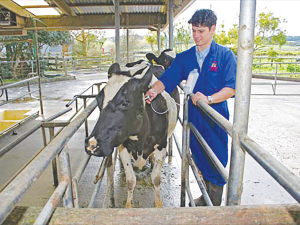NZVA urges animal owners to help fight antibiotic resistance through preventative care
Animal owners can help protect life-saving antibiotics from resistant bacteria by keeping their animals healthy, says the New Zealand Veterinary Association.
 The report highlights there is inadequate funding of veterinary schools to meet the cost of teaching future vets.
The report highlights there is inadequate funding of veterinary schools to meet the cost of teaching future vets.
A new report into the education of veterinarians has revealed a sustainability crisis within the sector.
The Rethinking Veterinary Education report from Veterinary Schools of Australia and New Zealand, released last month, is the first such report into veterinary education in over 20 years. It details a series of factors, including the funding models of veterinary education, sustainability in domestic and agricultural practice, and retention of veterinarians in both urban and rural areas that could lead to a severe crisis.
New Zealand Veterinary Association (NZVA) president Kate Hill says the sector is facing a number of challenges currently.
“We’ve got a global veterinary shortage and then this review highlights the fact that, as well as the workforce shortage, we’ve got the increasing demand of veterinary services in New Zealand across the whole sector,” Hill told Rural News.
She says that, additionally, the report highlights there is inadequate funding of veterinary schools to meet the cost of teaching future vets.
The report states that veterinary courses are the most expensive professional courses for universities to deliver. It says that the funding per veterinary student to universities from government grants and student fees only covers approximately twothirds of the average estimated total delivery cost per student.
Additionally, it states that incremental opportunities to reduce costs have largely been exhausted and more strategic, structural reforms are required.
Hill says that compounding the cost of educating veterinary students is the salaries those students are then provided when they qualify.
“The veterinary salaries, once they’ve graduated, are becoming uncompetitive with other professions. Other professions have been increasing and the veterinary salaries haven’t been increasing as much,” she adds.
Hills says that building a new veterinary school will not solve the issues at all. “The ultimate change is to improve the education crisis and try and be graduating more veterinarians, have a well-funded university model and happy, healthy university staff and students and veterinarians.”
New Zealand's new Special Agricultural Trade Envoy, Horowhenua dairy farmer, company director and former Minister of Agriculture, Nathan Guy says the Free Trade Agreement (FTA) with India is a good deal for the country.
New figures show dairy farmers are not only holding on to their international workforce, but are also supporting those staff to step into higher-skilled roles on farm.
New tractor deliveries for 2025 jumped 10% compared to the previous year, a reflection of the positive primary sector outlook, according to the Tractor and Machinery Association (TAMA).
Entries have opened for two awards in the New Zealand Dairy Industry Awards (NZDIA) programme, aimed at helping young farmers progress to farm ownership.
Federated Farmers has confirmed interim chief executive Mike Siermans to the role.
Registrations are now open for the 2026 Ruralco Golf Classic, with all proceeds from the event set to support the Mid Canterbury Rural Support Trust.

OPINION: If the hand-wringing, cravat and bow-tie wearing commentariat of a left-leaning persuasion had any influence on global markets, we'd…
OPINION: With Winston Peters playing politics with the PM's Indian FTA, all eyes will be on Labour who have the…